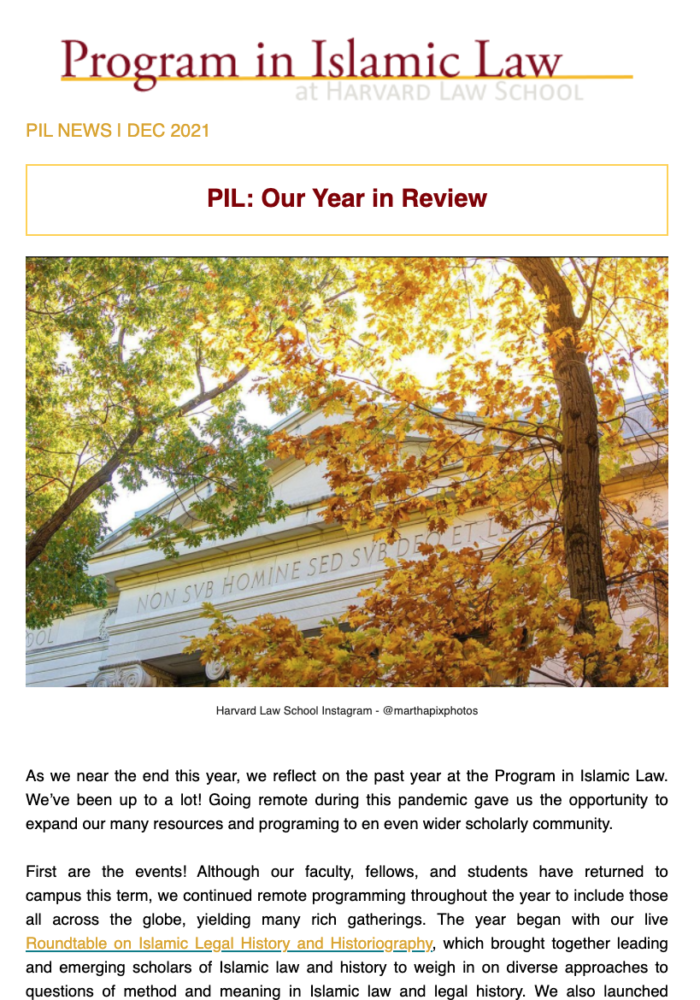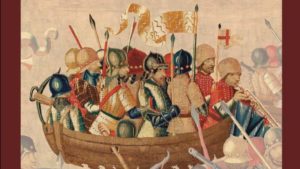
 PIL: Our Year in Review As we near the end this year, we reflect on the past year at the Program in Islamic Law. We’ve been up to a lot! Going remote during this pandemic gave us the opportunity to expand our many resources and programing to en even wider scholarly community. Check out our latest newsletter to read about all of our events, data science initiatives, publications, fellows, and students– including all of our fun! In short, there is a lot there, more to come, and plenty of ways to get involved or participate online. All of this has been achieved with the continuing support and engagement of both the local and broader global community members, such as yourself. Thank you, our work is made possible by you.
PIL: Our Year in Review As we near the end this year, we reflect on the past year at the Program in Islamic Law. We’ve been up to a lot! Going remote during this pandemic gave us the opportunity to expand our many resources and programing to en even wider scholarly community. Check out our latest newsletter to read about all of our events, data science initiatives, publications, fellows, and students– including all of our fun! In short, there is a lot there, more to come, and plenty of ways to get involved or participate online. All of this has been achieved with the continuing support and engagement of both the local and broader global community members, such as yourself. Thank you, our work is made possible by you.
 CONTENT: CnC Root Finder The Program of Islamic Law is currently developing a suite of digital Islamic law tools to expand access to and facilitate research in the field. The suite includes the Courts and Canons project, which is an interactive, collaborative project that places the Islamic legal tradition in a historical, socio-political, hermeneutical, and geographic context. One of our current lab experiments pertains to the development of a classical Arabic search indexer, where researchers will no longer need to specify exact phrases when searching for an expression, but can merely do a lookup via a related root. Whereas most search engines require you to specify terms independently, this indexer allows you to view a variety of terms that reference a related root. This gives the researcher immediate knowledge of the ways in which language is practiced, opening up doors of possibility!
CONTENT: CnC Root Finder The Program of Islamic Law is currently developing a suite of digital Islamic law tools to expand access to and facilitate research in the field. The suite includes the Courts and Canons project, which is an interactive, collaborative project that places the Islamic legal tradition in a historical, socio-political, hermeneutical, and geographic context. One of our current lab experiments pertains to the development of a classical Arabic search indexer, where researchers will no longer need to specify exact phrases when searching for an expression, but can merely do a lookup via a related root. Whereas most search engines require you to specify terms independently, this indexer allows you to view a variety of terms that reference a related root. This gives the researcher immediate knowledge of the ways in which language is practiced, opening up doors of possibility! CONTEXT: New Book! Leaving Iberia Last month we announced the publication of the latest book in our Harvard Series in Islamic Law,Dr.Jocelyn Hendrickson‘sLeaving Iberia: Islamic Law and Christian Conquest in North West Africa! This book examines Islamic legal responses to Muslims living under Christian rule in medieval and early modern Iberia and North Africa. The fall of al-Andalus, or reconquista, has long been considered a turning point, when the first substantial Muslim populations fell under permanent Christian rule. Yet a near-exclusive focus on conquered Iberian Muslims has led scholars to overlook a substantial body of legal opinions issued in response to Portuguese and Spanish occupation in Morocco itself, beginning in the early fifteenth century. Check out the book today!
CONTEXT: New Book! Leaving Iberia Last month we announced the publication of the latest book in our Harvard Series in Islamic Law,Dr.Jocelyn Hendrickson‘sLeaving Iberia: Islamic Law and Christian Conquest in North West Africa! This book examines Islamic legal responses to Muslims living under Christian rule in medieval and early modern Iberia and North Africa. The fall of al-Andalus, or reconquista, has long been considered a turning point, when the first substantial Muslim populations fell under permanent Christian rule. Yet a near-exclusive focus on conquered Iberian Muslims has led scholars to overlook a substantial body of legal opinions issued in response to Portuguese and Spanish occupation in Morocco itself, beginning in the early fifteenth century. Check out the book today!
See the full newsletter.

